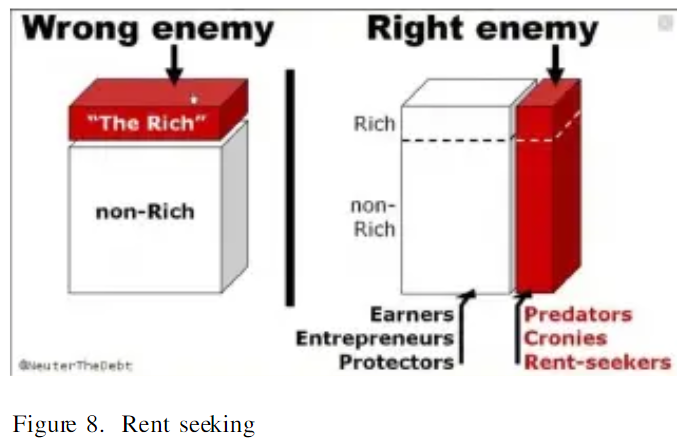It’s a lazy, rainy day, and for amusement, I’ve been reading Nassim Nicholas Taleb’s online work, “Principia Politica,” in which he applies his insights into risk, probability, and the non-linearity of complex systems to the realm of governance and politics. The graphic displayed above appears about halfway through the presentation without any elaboration but it beautifully summarizes how I view the world.
The left-hand image summarizes the thinking of the political left in the United States today, which defines “the rich” — the millionaires and billionaires, in Bernie Sanders parlance — as the enemy. The underlying assumption is that all wealth is, to one degree or another, illegitimately gained and that concentrations of wealth are harmful to society. This is the default mode of thinking of much of academia, the journalism “profession, think tank pundits and the nation’s intelligentsia.
The right-hand image summarizes the thinking of those, like me, of a conservative-libertarian bent. I have no problem with the existence of rich people in our society. I am far more interested in how people acquired their wealth. To me, predators, cronies and rent seekers are the bad guys.
Entrepreneurs who acquire wealth by creating products and services that customers purchase voluntarily help make the world a better place. Riches provide a tangible reward for their creativity, passion, and drive. I do not begrudge the wealth of men like Steve Jobs, Bill Gates, and Jeff Bezos. They engaged in win-win wealth creation. My life has improved immeasurably from the invention of the iPhone, Microsoft Office, and e-commerce, and I pay them my money gladly.
The people I resent — those who are, in the typology above, the right enemy — are those who engage in rent seeking, manipulating the coercive power of the state, to accumulate wealth. Rent-seekers and monopolists engage in win-lose wealth creation. Their gain comes at someone else’s expense. Who might fall into this category? Wall Street bankers who use government to privatize profits and socialize losses. Special pleaders who seek government grants, loans, subsidies and tax exemptions not available to others. Businesses that capture the regulatory apparatus to erect barriers to competition and protect their positions of economic privilege.
Here at Bacon’s Rebellion I am dedicated to supporting the activities of wealth-creating entrepreneurs. Every day I ask myself, how can Virginia create a business climate conducive to innovation, productivity and the legitimate creation and accumulation of wealth? I am equally dedicated to exposing the machinations of those who engage in rent seeking at the level of state/local government to extract wealth from those less politically powerful.
Among the rent-seeking extractors of wealth we have called out are the faculty-administrative elites of our colleges and universities and the administrators of our “nonprofit” health care systems. We have focused on these because they have a huge impact on our collective well being, but there are many others, and we will call them out as well when we come across them.
Sadly, the rent seekers hold the power in Virginia. But Bacon’s Rebellion will not relent in its pursuit of a truly fair and just society.


Leave a Reply
You must be logged in to post a comment.